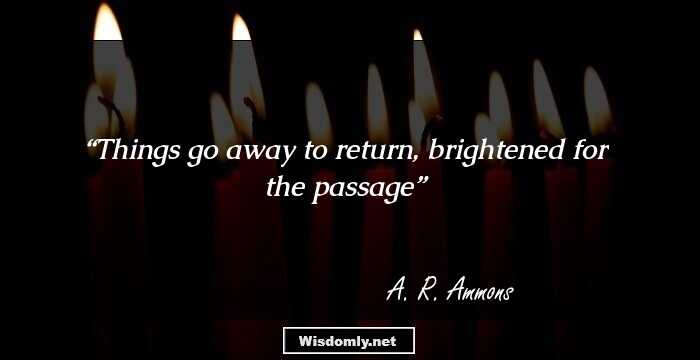71 Lewis Thomas Quotes On Life, Science & More
One of the biggest names in the field of etymology, Lewis Thomas was a respected essayist, physician, poet and researcher, also renowned for his excellence in the fields of biology, science writing and academic administration. An alma mater of the prestigious Princeton University and Harvard Medical School, Thomas held honorable positions at Yale Medical School, New York University School of Medicine and Memorial Sloan-Kettering Institute. With his notable works ‘The Lives of a Cell’, ‘The Medusa and the Snail’, ‘The Youngest Science’, ‘The Fragile Species and ‘Et Cetera, Et Cetera’, he went on to receive the National Book Awards thrice. With his signature eclectic interests and superlative prose style, he tried to inculcate inception of ideas through the concepts of etymology. His thoughts and sayings focused on issues such as humanity, diversity, evolution, importance of knowledge, circle of life and technology. Here is a collection of quotes elaborating the mindset of this famous etymologist.
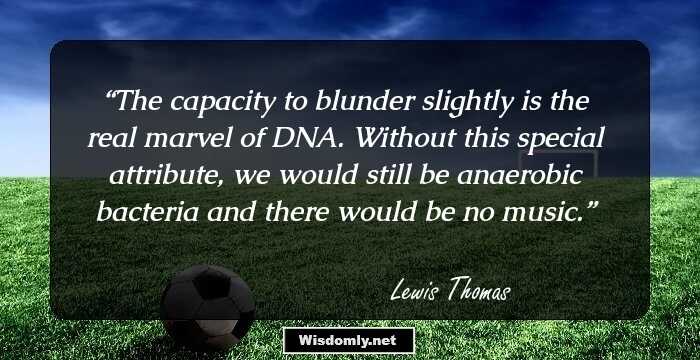
The capacity to blunder slightly is the real marvel of DNA. Without this special attribute, we would still be anaerobic bacteria and there would be no music.
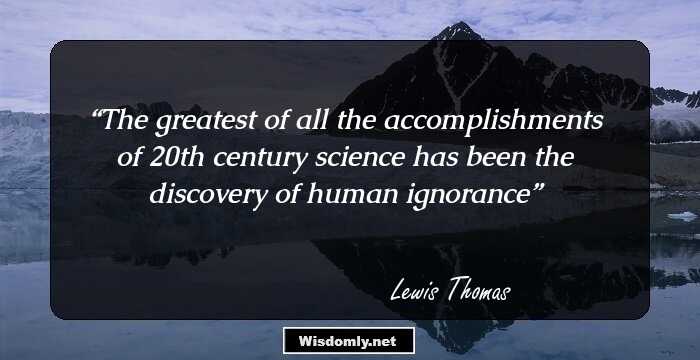
The greatest of all the accomplishments of 20th century science has been the discovery of human ignorance
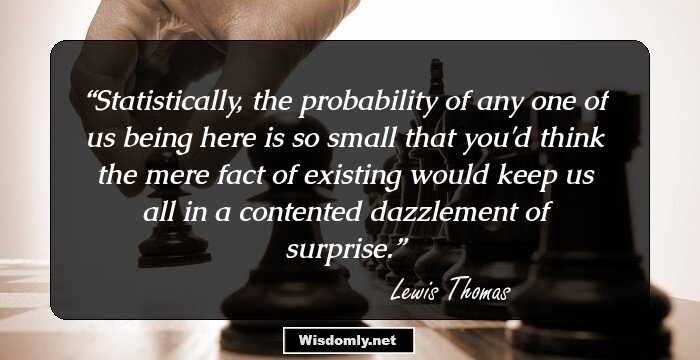
Statistically, the probability of any one of us being here is so small that you'd think the mere fact of existing would keep us all in a contented dazzlement of surprise.
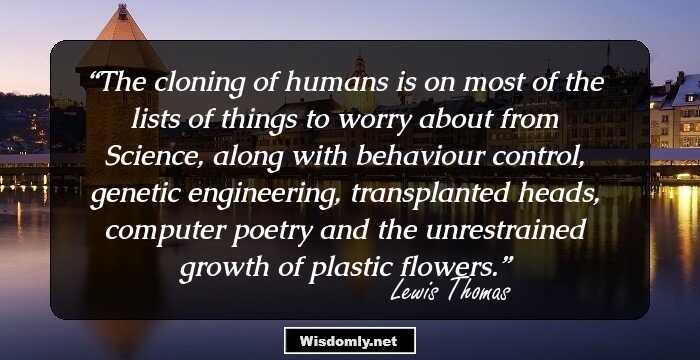
The cloning of humans is on most of the lists of things to worry about from Science, along with behaviour control, genetic engineering, transplanted heads, computer poetry and the unrestrained growth of plastic flowers.
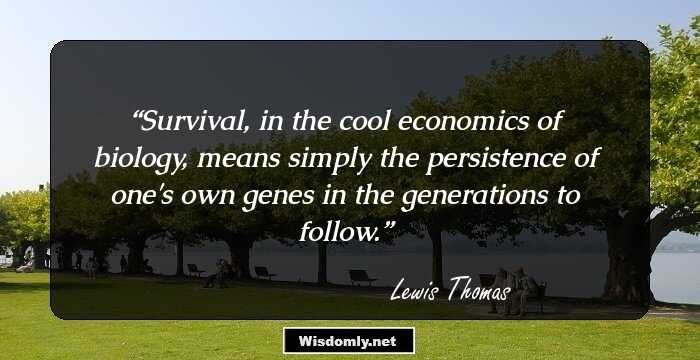
Survival, in the cool economics of biology, means simply the persistence of one's own genes in the generations to follow.
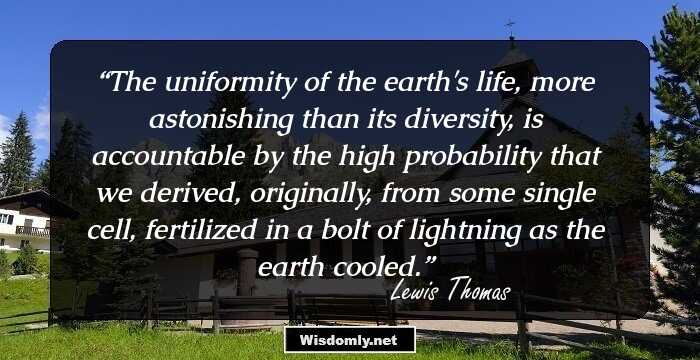
The uniformity of the earth's life, more astonishing than its diversity, is accountable by the high probability that we derived, originally, from some single cell, fertilized in a bolt of lightning as the earth cooled.
Of all celestial bodies within reach or view, as far as we can see, out to the edge, the most wonderful and marvellous and mysterious is turning out to be our own planet earth. There is nothing to match it anywhere, not yet anyway.
Sometimes you get a glimpse of a semicolon coming, a few lines farther on, and it is like climbing a steep path through woods and seeing a wooden bench just at a bend in the road ahead, a place where you can expect to sit for a moment, catching your breath.
There's really no such thing as the agony of dying. I'm quite sure that pain is shut off at the moment of death. You see, something happens when the body knows it's about to go. Peptide hormones are released by cells in the hypothalamus and pituitary gland. Endorphins. They attach themselves to the cells responsible for feeling pain.
Ants are so much like human beings as to be an embarrassment. They farm fungi, raise aphids as livestock, launch armies into war, use chemical sprays to alarm and confuse enemies, capture slaves, engage in child labour, exchange information ceaselessly. They do everything but watch television.
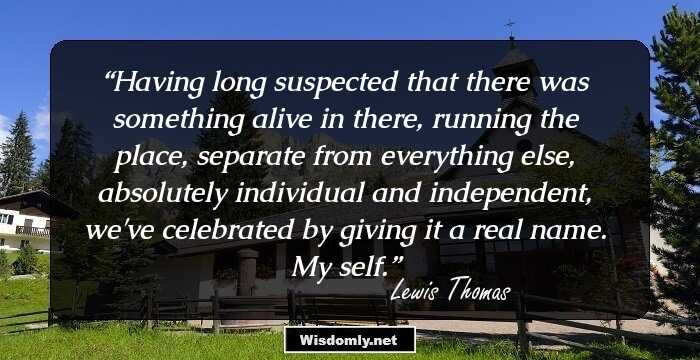
Having long suspected that there was something alive in there, running the place, separate from everything else, absolutely individual and independent, we've celebrated by giving it a real name. My self.
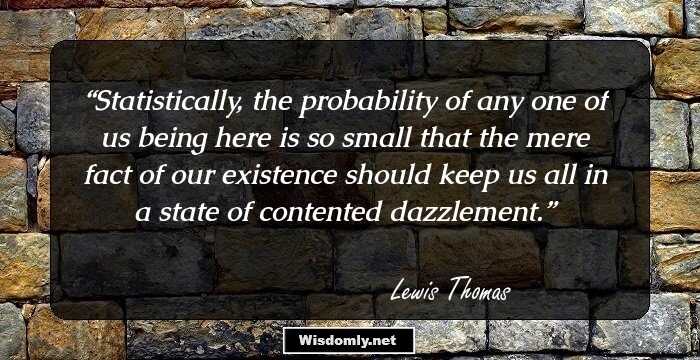
Statistically, the probability of any one of us being here is so small that the mere fact of our existence should keep us all in a state of contented dazzlement.
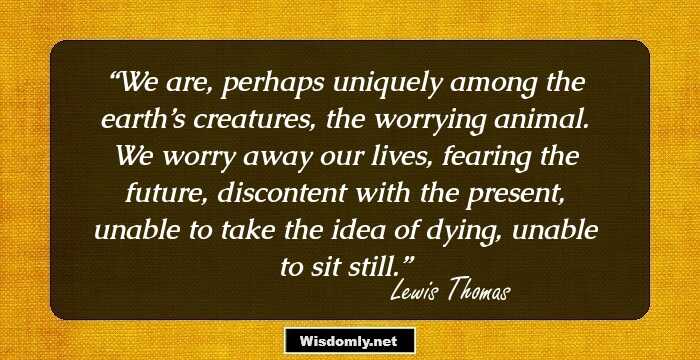
We are, perhaps uniquely among the earth’s creatures, the worrying animal. We worry away our lives, fearing the future, discontent with the present, unable to take the idea of dying, unable to sit still.
We're as clever as we think we are, but we'll be a lot cleverer when we learn to use not just one brain but to pool huge numbers of brains. We're at a level technologically where we can share information and think collectively about our problems. We do it in science all the time - there's no reason why we can't do it in other endeavors.
Given the opportunity, under the right conditions, two cells from wildly different sources, a yeast cell, say, and a chicken erythrocyte, will touch, fuse, and the two nuclei will then fuse as well, and the new hybrid cell will now divide into monstrous progeny. Naked cells, lacking self-respect, do not seem to have any sense of self.
Our behavior toward each other is the strangest, most unpredictable, and most unaccountable of all the phenomena with which we are obliged to live. In all of nature, there is nothing so threatening to humanity as humanity itself.
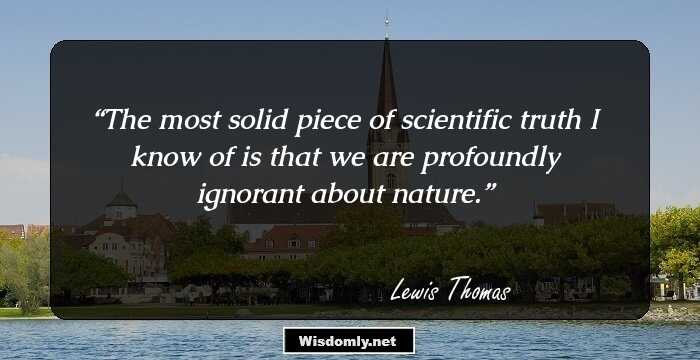
The most solid piece of scientific truth I know of is that we are profoundly ignorant about nature.
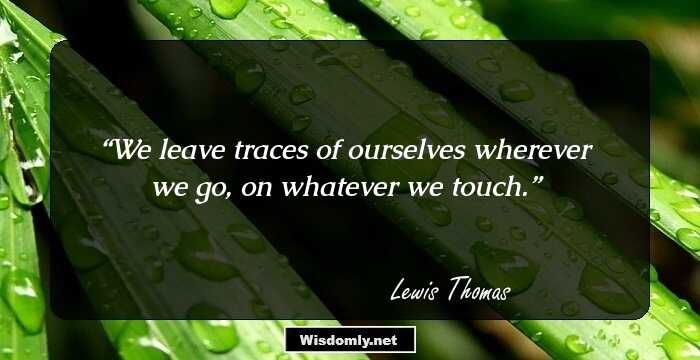
We leave traces of ourselves wherever we go, on whatever we touch.
Doctors, dressed up in one professional costume or another, have been in busy practice since the earliest records of every culture on earth. It is hard to think of a more dependable or enduring occupation, harder still to imagine any future events leading to its extinction.
I won't compare ants and people, but ants give us a useful model of how single members of a community can become so organized that they end up resembling, in effect, one big collective brain. Our own exploding population and communication technology are leading us that way.
We habitually engage in meddling with nature. Until this century most of this meddling was good. Witness the preservation of the European countryside. But since then we've smoked it up and littered it and dumped too much in too many waters. I don't think it's our privilege to behave this way.
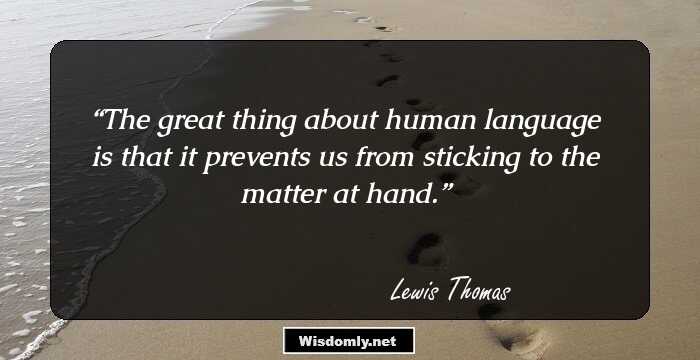
The great thing about human language is that it prevents us from sticking to the matter at hand.
We are not made up, as we had always supposed, of successively enriched packets of our own parts. We are shared, rented, occupied. At the interior of our cells, driving them, providing the oxidative energy that sends us out for the improvement of each shining day, are the mitochondria, and in a strict sense they are not ours.
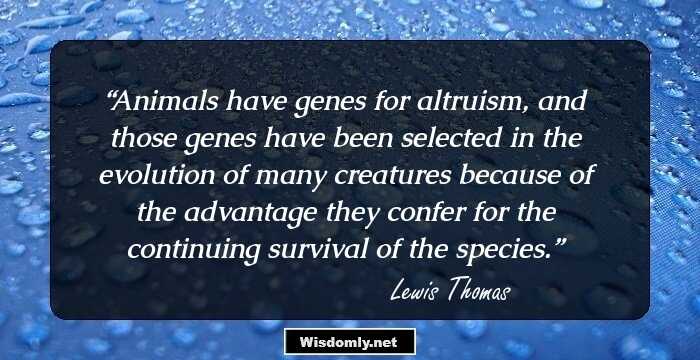
Animals have genes for altruism, and those genes have been selected in the evolution of many creatures because of the advantage they confer for the continuing survival of the species.
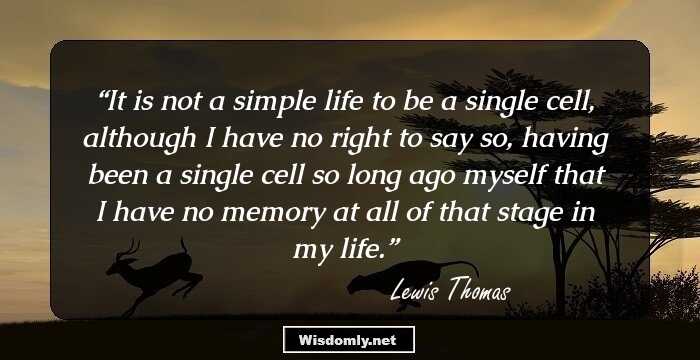
It is not a simple life to be a single cell, although I have no right to say so, having been a single cell so long ago myself that I have no memory at all of that stage in my life.
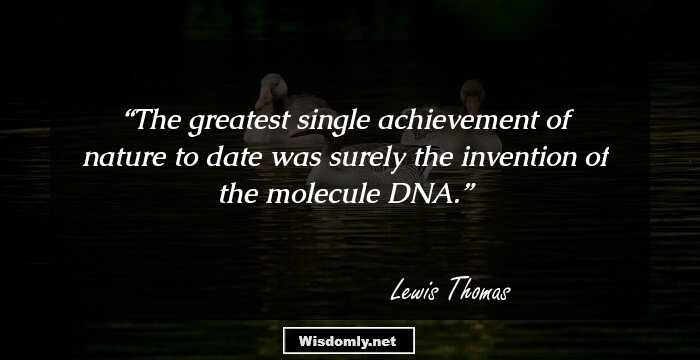
The greatest single achievement of nature to date was surely the invention of the molecule DNA.
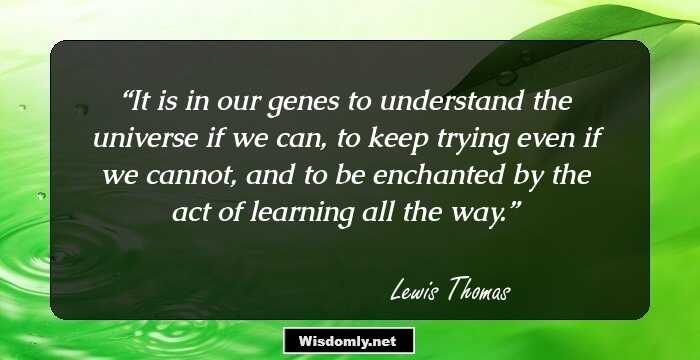
It is in our genes to understand the universe if we can, to keep trying even if we cannot, and to be enchanted by the act of learning all the way.
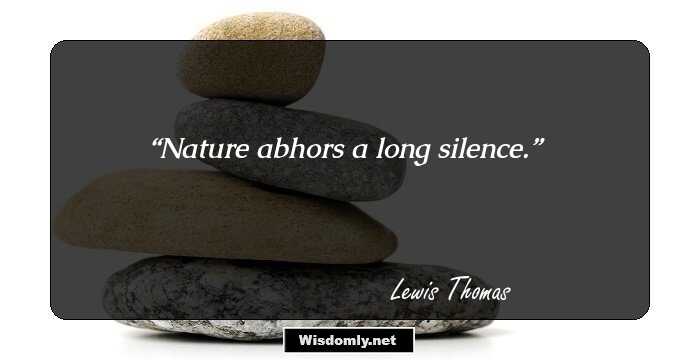
Nature abhors a long silence.
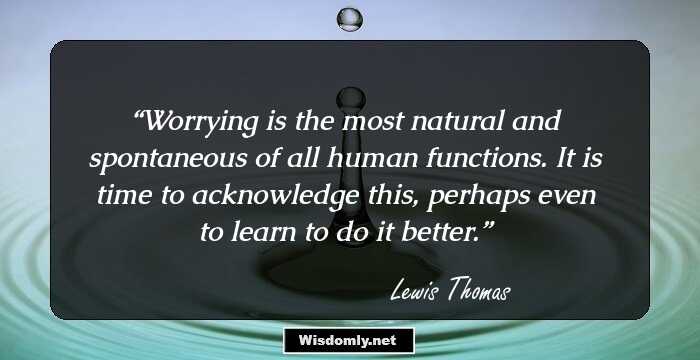
Worrying is the most natural and spontaneous of all human functions. It is time to acknowledge this, perhaps even to learn to do it better.
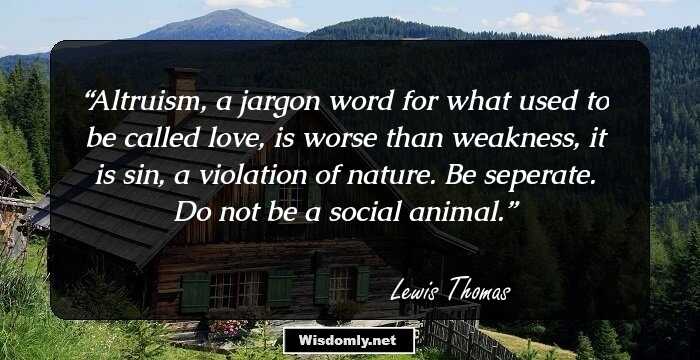
Altruism, a jargon word for what used to be called love, is worse than weakness, it is sin, a violation of nature. Be seperate. Do not be a social animal.


